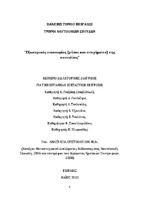Εξωτερικές οικονομίες (ρύποι και ατυχήματα) της ναυτιλίας
Externalities (emissions and accidents) from shipping

Doctoral Thesis
Συγγραφέας
Χριστοδούλου, Αναστασία Γεώργιος
Ημερομηνία
2013Επιβλέπων
Γκιζιάκης, ΚωνσταντίνοςΠροβολή/
Θεματική επικεφαλίδα
Πλοία -- Περιβαλλοντικές απόψεις ; Πλοία -- Κανονισμοί ασφαλείας -- Διοίκηση και οργάνωση ; Περιβαλλοντική πολιτική ; Ατμοσφαιρική μόλυνσηΠερίληψη
Η ιδέα της διατριβής προέρχεται από την αυξανόμενη ευαισθησία των ερευνητών για τις ολοένα αυξανόμενες επιπτώσεις της κλιματικής αλλαγής και ειδικότερα της ρύπανσης της ατμόσφαιρας από τα λεγόμενα αέρια του θερμοκηπίου. Η ναυτιλία είναι μια από τις βιομηχανίες, οι οποίες συμβάλλουν στις εκπομπές των αερίων αυτών παρόλο που η συμβολή αυτή είναι περιορισμένη. Το ζήτημα που απασχολεί τη διατριβή αυτή είναι η διερεύνηση των κατάλληλων τεχνικών, λειτουργικών και αγορακεντρικών εργαλείων για την αντιμετώπιση των εκπομπών αερίων του θερμοκηπίου από τα πλοία. Πιο συγκεκριμένα, τα εργαλεία αναλύονται και αξιολογούνται, και αυτά είναι ο Σχεδιαστικός Δείκτης Ενεργειακής Αποδοτικότητας (Energy Efficiency Design Index - EEDI), το Σχέδιο Ενεργειακά Αποδοτικής Διαχείρισης του Πλοίου (Ship Energy Efficiency Management Plan - SEΕMP) και ο Λειτουργικός Δείκτης Ενεργειακής Αποδοτικότητας (Energy Efficiency Operational Indicator – EEΟI), το Ναυτιλιακό Σύστημα Αγοραπωλησίας Δικαιωμάτων Εκπομπών (Maritime Emission Trading Scheme - METS) και ο διεθνής φόρος στο ναυτιλιακό καύσιμο (Global levy scheme on marine bunker fuel). Η διατριβή αυτή κινείται σε δυο άξονες, καθώς από τη μία αξιολογούνται οι μηχανισμοί περιορισμού των εκπομπών αερίων του θερμοκηπίου από τα πλοία ως προς: (α) την περιβαλλοντική τους αποτελεσματικότητα, (β) την οικονομική τους αποδοτικότητα, (γ) την παροχή κινήτρων για τεχνολογική αλλαγή και (δ) την πρακτική τους εφαρμογή (ποιοτική έρευνα), ενώ από την άλλη πραγματοποιήθηκε εκτεταμένη έρευνα (ποσοτική - στατιστική) με ερωτηματολόγια σε δείγμα από το σύνολο των ναυτιλιακών επιχειρήσεων που δραστηριοποιούνται στον Ελληνικό χώρο, μέσα από την οποία εξήχθησαν για πρώτη φορά συμπεράσματα σχετικά με τον τρόπο που αντιμετωπίζει η ναυτιλιακή βιομηχανία, ουσιαστικά η Ελληνόκτητη ναυτιλιακή βιομηχανία, την υιοθέτηση των διαφόρων προτεινόμενων τεχνικών, λειτουργικών και οικονομικών εργαλείων για τον περιορισμό των εκπομπών αερίων του θερμοκηπίου από τον στόλο της.Τα αποτελέσματα της έρευνας αυτής αντικατοπτρίζουν την περιβαλλοντική συμπεριφορά και τις πρακτικές σχετικά με τις ναυτιλιακές εκπομπές αερίων του θερμοκηπίου ενός αντιπροσωπευτικού μέρους της Ελληνόκτητης ναυτιλιακής βιομηχανίας, μιας και το δείγμα περιλαμβάνει ναυτιλιακές εταιρείες διαφόρων μεγεθών, οι οποίες συμμετέχουν σε διάφορους τομείς της ναυτιλιακής βιομηχανίας. Λαμβάνοντας υπόψη το μέγεθος και τη σημασία της Ελληνόκτητης ναυτιλιακής βιομηχανίας στο πεδίο της διεθνούς ναυτιλίας, τα αποτελέσματα της έρευνας αυτής παρουσιάζουν σήμερα μια ιδιαίτερη σημασία, μιας και θα μπορούσαν να αναλυθούν περαιτέρω και να ληφθούν υπόψη για την επίτευξη της συμμόρφωσης της ναυτιλιακής βιομηχανίας με οποιαδήποτε μελλοντικά τεχνικά, λειτουργικά ή οικονομικά εργαλεία για τη μείωση των ναυτιλιακών εκπομπών αερίων του θερμοκηπίου.


